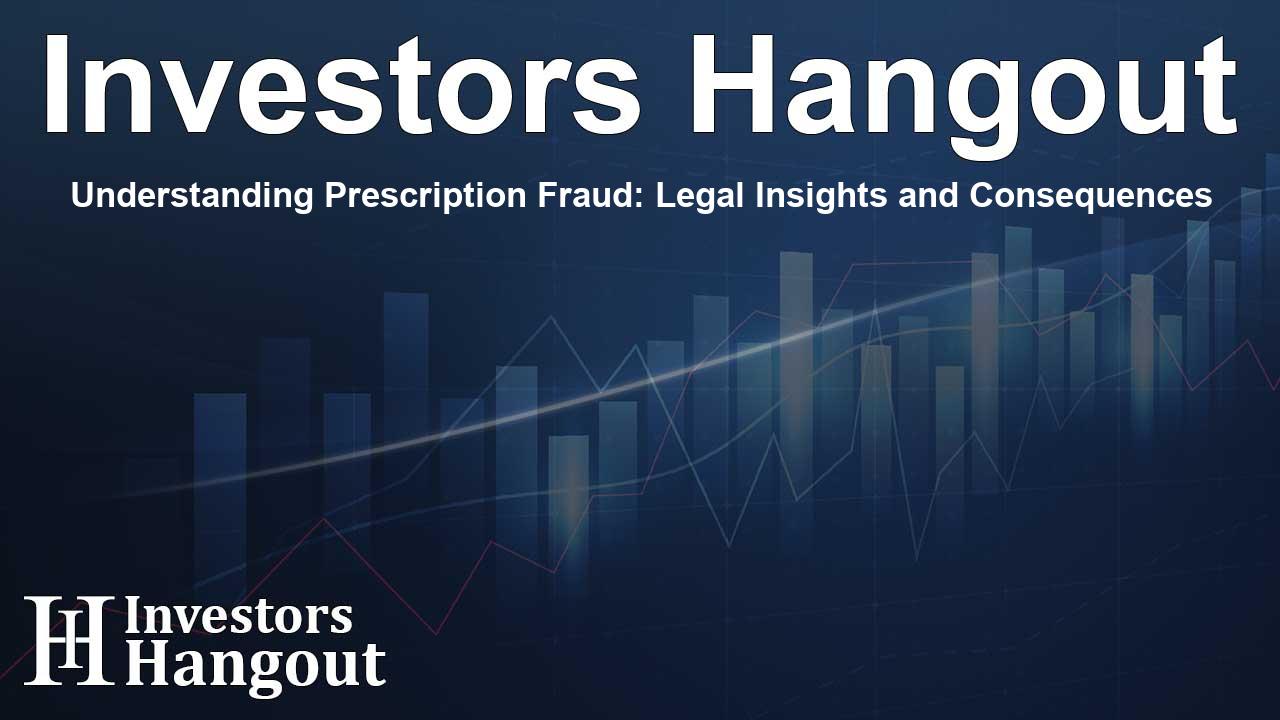Understanding Prescription Fraud: Legal Insights and Consequences

Understanding Prescription Fraud and Its Legal Ramifications
Prescription drug abuse has become a significant issue in recent times, with many individuals facing severe legal consequences due to prescription fraud. Although this crime is often associated with patients seeking extra medications, it is essential to recognize that healthcare professionals can also be implicated. Those accused of prescription fraud need comprehensive legal guidance to navigate these complex charges effectively.
Defining Prescription Fraud
Prescription fraud encompasses illegal attempts to obtain or distribute prescription medications. Individuals working within the healthcare system, such as nurses, pharmacists, and physicians, have easy access to these medications, creating opportunities for fraud. However, misrepresentation and deceit can occur in various forms — it is not limited to just writing unauthorized prescriptions. Actions like forging prescriptions, stealing prescription pads, and misrepresenting symptoms to healthcare providers fall under the umbrella of prescription fraud.
Common Forms of Prescription Fraud
There are several actions that can be classified as prescription fraud. Here are some common methods:
- Forging or Altering Prescriptions: This involves creating fake prescriptions or modifying current ones to receive more medication than prescribed.
- Selling Prescription Drugs: Offering to sell prescription medication obtained through fraudulent means without a valid prescription.
- Stealing Prescription Pads: Taking prescription forms from healthcare facilities and using them to create unauthorized prescriptions.
- Using Deception: Lying to healthcare providers about health issues or using a false identity to gain access to medications.
Is It a Criminal Offense?
Yes, in numerous jurisdictions, including Kansas, prescription fraud is treated as a criminal offense that may lead to either misdemeanor or felony charges. The classification of charges often depends on the individual's criminal history and whether the fraudulent activity occurred within a professional capacity.
Legal Advice on Prescription Fraud
As noted by legal experts, "Prescription fraud can lead to dire consequences, and individuals involved in the healthcare field are frequently at risk due to their access to controlled substances. It is important for anyone implicated to seek legal counsel immediately, as addressing these charges early can significantly influence the outcome of a case." Understanding the legal landscape is crucial for anyone facing such allegations.
Potential Penalties for Prescription Fraud
The penalties associated with prescription fraud can vary widely based on the context of the offense. Factors affecting the severity of the charges include whether the case is a first offense, the methods used in the fraud, and if the person sold fraudulent prescriptions. Generally speaking, consequences for prescription fraud may include:
- Fines: Monetary penalties are often assessed, based on the severity of the offense.
- Imprisonment: Those found guilty could face a jail or prison sentence, particularly for severe cases.
- Probation: Offenders may be placed under supervision by the court, with additional requirements like attending treatment programs.
- Loss of Professional License: Healthcare providers risk losing their licenses permanently if convicted of prescription fraud.
- Restitution: Offenders may be required to repay any victims impacted by their fraudulent activities.
Steps to Take If Accused
If you find yourself facing charges of prescription fraud, it is vital to avoid discussing your case publicly or with anyone other than your legal representative. These accusations can have drastic effects on your career and future. Contacting an experienced attorney can ensure that your rights are protected and that you navigate the complexities of your case appropriately.
Contact a Legal Expert
Are you facing allegations of prescription fraud? It is crucial to engage with a skilled legal professional who can assist you in your defense. Seeking counsel promptly can make a significant difference in how your case is handled.
Frequently Asked Questions
What constitutes prescription fraud?
Prescription fraud involves any illegal attempt to obtain or distribute prescription medications, which can include actions like forgery or misrepresentation.
Who can be charged with prescription fraud?
Both patients and healthcare professionals can face charges for prescription fraud, as anyone attempting to illegally obtain medications can be implicated.
What penalties can I face for prescription fraud?
Consequences can range from fines and imprisonment to loss of professional licenses and court-ordered restitution to victims.
How should I respond if accused of prescription fraud?
It is crucial to avoid discussing your case publicly and to seek immediate legal counsel to protect your rights and navigate your situation effectively.
Can I lose my job due to a prescription fraud charge?
Yes, if convicted, you may face job termination, especially if you are in a position that requires a professional license.
About The Author
Contact Dylan Bailey privately here. Or send an email with ATTN: Dylan Bailey as the subject to contact@investorshangout.com.
About Investors Hangout
Investors Hangout is a leading online stock forum for financial discussion and learning, offering a wide range of free tools and resources. It draws in traders of all levels, who exchange market knowledge, investigate trading tactics, and keep an eye on industry developments in real time. Featuring financial articles, stock message boards, quotes, charts, company profiles, and live news updates. Through cooperative learning and a wealth of informational resources, it helps users from novices creating their first portfolios to experts honing their techniques. Join Investors Hangout today: https://investorshangout.com/
The content of this article is based on factual, publicly available information and does not represent legal, financial, or investment advice. Investors Hangout does not offer financial advice, and the author is not a licensed financial advisor. Consult a qualified advisor before making any financial or investment decisions based on this article. This article should not be considered advice to purchase, sell, or hold any securities or other investments. If any of the material provided here is inaccurate, please contact us for corrections.
